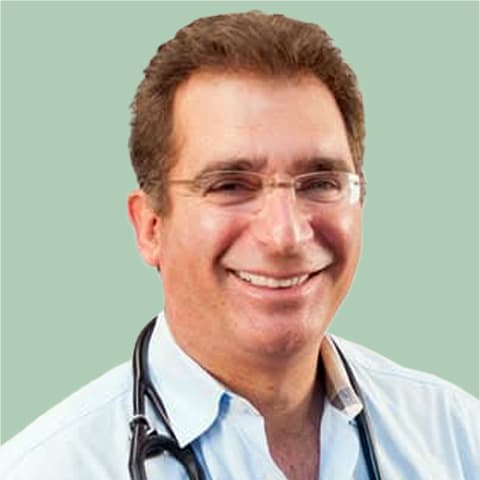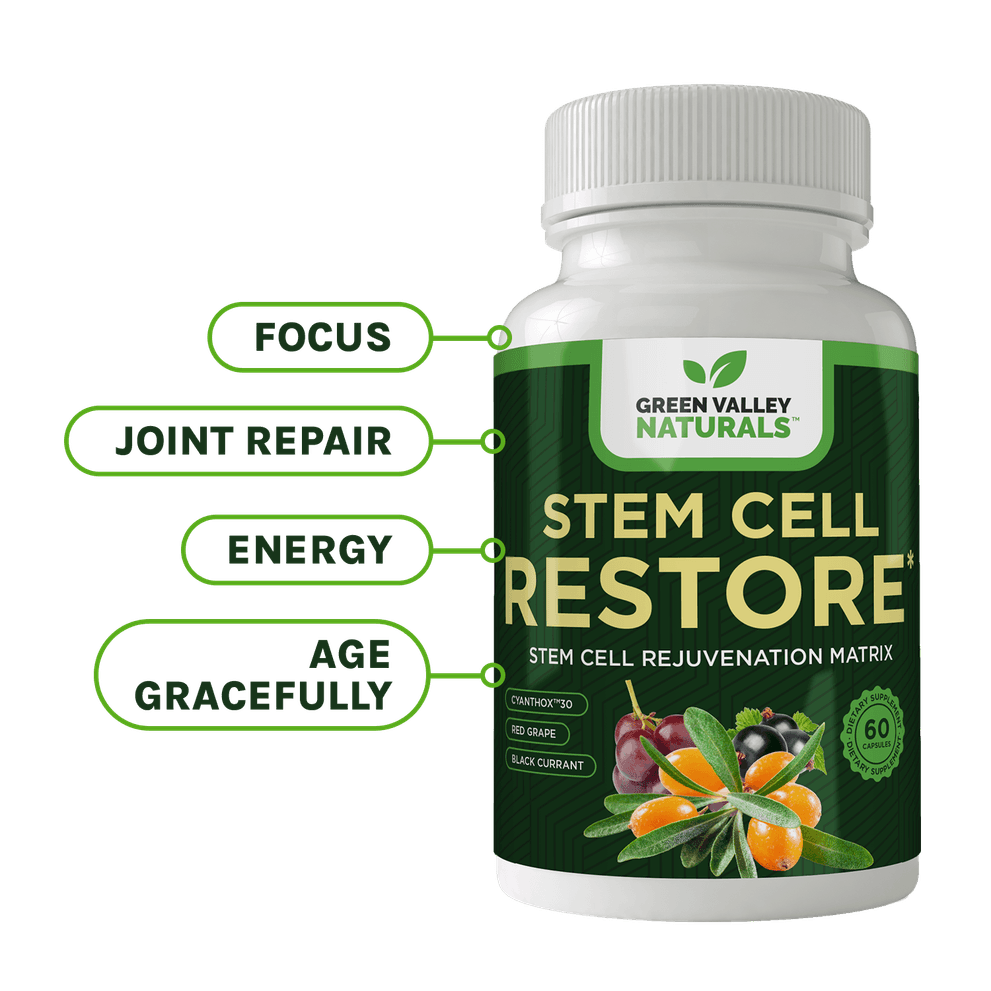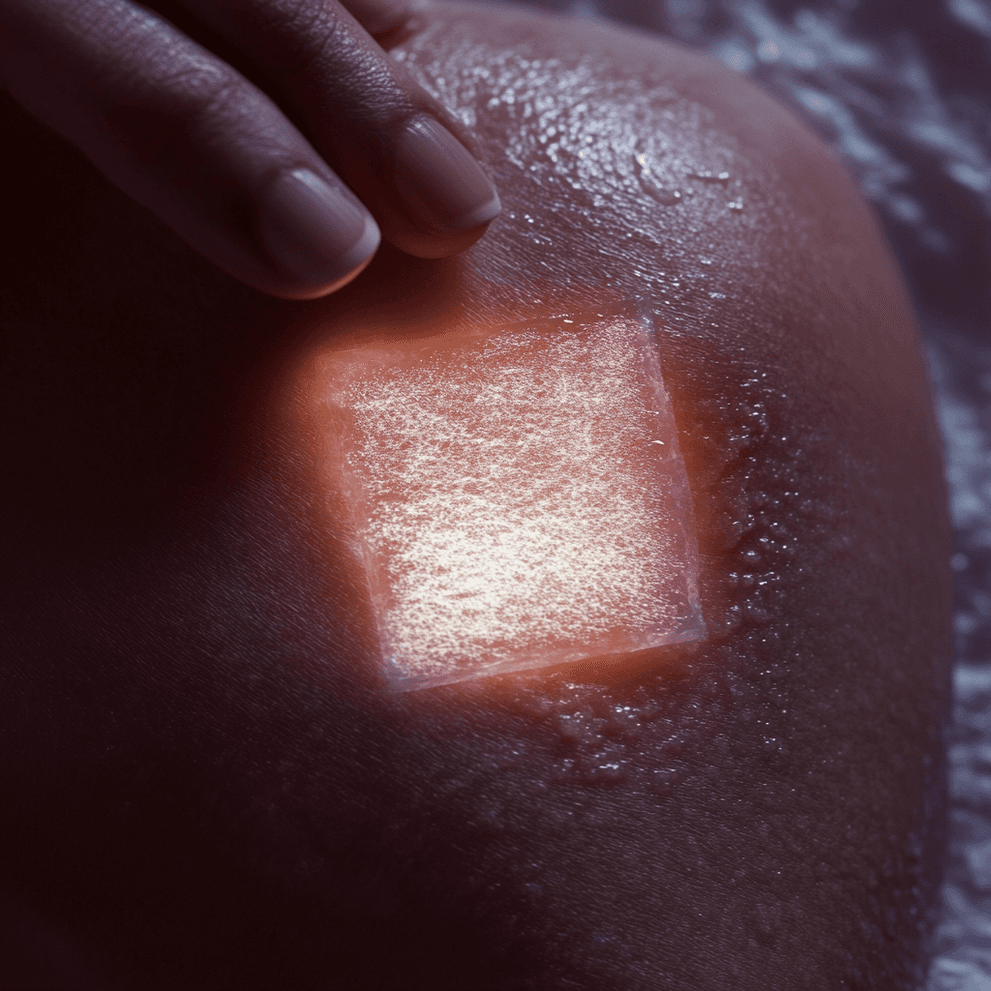
You’ve probably heard of stem cell therapy as the frontier of regenerative medicine—but what if the power to revitalize your body already lives inside you?
Emerging science reveals that your daily choices—what you eat, how you sleep, even how you manage stress—can influence the health and activity of your own stem cells. Even more surprising? Certain everyday foods and natural compounds may help you activate and protect these powerful repair cells—no lab coats or injections required. Curious how it all works? Keep reading to uncover the kitchen-table revolution quietly reshaping the future of your health.
Key Takeaways
You influence your stem cell health daily through diet, sleep, exercise, and stress.
Certain foods and supplements like resveratrol, sea buckthorn, fisetin, NMN, sulforaphane, and vitamin D3 may naturally boost stem cell function.
Avoiding metabolic and inflammatory stressors like sugar, processed foods, and alcohol is just as crucial as what you add to your regimen.
Stem Cells: There's More Than One Kind
Stem cells are the body's master cells—capable of developing into different cell types and serving as an internal repair system. This capacity makes them crucial for replenishing dying cells, regenerating damaged tissues, and maintaining overall health. Human stem cells come in several types, based on their origin and ability to differentiate into other cell types.
Adult stem cells (or somatic), found in tissues like bone marrow or fat, are multipotent and more limited in their specialization but are commonly used in therapies. These are the stem cells we'll primarily be referring to in this article. One example is hematopoietic stem cells.
Induced pluripotent stem cells (iPSCs) are adult stem cells reprogrammed to behave like embryonic ones, offering ethical and personalized treatment potential.
Perinatal stem cells, from sources like umbilical cord blood or placenta, are ethically collected and used in regenerative therapies.
Human embryonic stem cells (ESCs) are pluripotent and can turn into nearly any cell type in the body, but they raise ethical concerns.
Aging can lead to impaired stem cell function, reduced regenerative capacity, and a decline in the number of stem cells. So, what can you do to improve your stem cell health and help your body naturally increase the adult stem cells that can keep you looking and feeling younger?
The Stem Cell Revolution in Your Kitchen Cabinet
Saving your stem cells starts with nutrition. Nutrition plays a crucial role in supporting stem cell health, with a balanced diet providing the essential nutrients and energy required for optimal stem cell function.
For one thing, nutrients can act as signaling molecules that regulate stem cell self-renewal, differentiation, metabolism, and interaction with the tissues surrounding them. Furthermore, diet can trigger epigenetic changes, or genetic changes, in stem cells, which in turn affect gene expression and ultimately determine cell fate. In other words, gene expression can decide whether your cells live or die.1
Stem Cell Friendly Foods
A healthy diet that includes a variety of whole foods can provide the necessary nutrients for more stem cells and improve stem cell function. This can reduce the risk of chronic diseases such as cardiovascular disease (heart disease).
A diet rich in fruits, vegetables, whole grains, and healthy fats, such as those found in cold water fatty fish, can provide the necessary nutrients for stem cell growth and function as you age. Specifically, omega-3 fatty acids (DHA/EPA) or fish oil from cold water fatty fish can contribute to stem cell membrane integrity and help maintain the anti-inflammatory environment stem cells need to thrive. They can also bind to a receptor on fat stem cells, promoting their division and leading to a healthier distribution of fat storage.
Foods rich in antioxidants, such as fresh fruits and green leafy vegetables, can help reduce oxidative stress caused by free radicals, also known as reactive oxygen species, and promote hematopoietic stem cell health.3
Specific nutrients like amino acids and vitamins have also been shown to directly influence the behavior of different types of stem cells. For example, amino acids such as leucine are essential building blocks and signaling molecules that influence the mTOR pathway, which is crucial for the function of muscle stem cells and skeletal muscle regeneration. Other essential amino acids like methionine and valine have been shown to impact intestinal stem cell proliferation and improve stem cell count.4
What You Don't Eat Is Just As Important As What You Do
Metabolic factors have a direct impact on the function of stem cells. High triglyceride levels, which can result from consuming more carbohydrates than are burned, are associated with metabolic syndrome and can impede stem cell growth.5
Conversely, balancing triglycerides with high-quality omega-3 fatty acids can support stem cell activity.
Avoiding inflammatory agents, such as those found in processed foods (think french fries!) and excessive alcohol consumption, can help promote stem cell health and reduce the risk of disease. Reduced sugar intake is important as high glucose levels can inhibit stem cell proliferation and cause oxidative stress, impairing the proliferation and migration of cells. High-fat and high-glucose environments can also inhibit bone regeneration. Ketogenic diets, which mimic low-calorie states, can enhance stem cell self-renewal and tissue regeneration, whereas high-carbohydrate diets have opposing effects.
Additionally, dietary restriction, such as calorie restriction, can promote stem cell function and reduce oxidative stress, leading to improved overall health and increased longevity. For example, calorie restriction can enhance intestinal stem cell function. Calorie restriction has been shown to promote endogenous stem cell function and reduce oxidative stress, leading to improved overall health and increased longevity. Studies suggest that calorie restriction, like certain nutrients, can promote changes in gene expression that support stem cell function and reduce systemic inflammation.8
Can Nutritional Supplements Help Naturally Increase Stem Cells?
The truth is, while high-tech stem cell therapies grab headlines, researchers are finding that nutrients in everyday foods and supplements may help maintain your body's existing stem cell function for years to come.2,9 What's fascinating is that some of these compounds have been used in traditional medicine systems from around the world for centuries. Modern science is just beginning to understand their mechanisms.

Nutritional Support For Stem Cells
1. Resveratrol: Grape's Anti-Aging Secret
While resveratrol gained fame as the compound behind the "French Paradox", the theory that the French enjoy great heart health despite a diet of fatty foods because of their red wine intake, its benefits extend far beyond cardiovascular protection. Found in the skin of red grapes, berries, and in Japanese knotweed, resveratrol mimics some of the beneficial effects of calorie restriction upon stem cells.
"Resveratrol activates sirtuins—proteins that regulate cellular health and longevity," explains epigeneticist Dr. Michael Rivera. "For stem cells, this means enhanced self-renewal and better protection against environmental stressors."
In one laboratory study, resveratrol increased adult repair stem cells (mesenchymal cells) by 200%!
Trans-resveratrol is the biologically active and most stable form of resveratrol, meaning it's the one responsible for the health benefits associated with resveratrol, such as anti-aging, anti-inflammatory, and antioxidant effects.
For example, trans-resveratrol is a potent antioxidant that helps protect cells from oxidative stress and free radical damage. This action supports the body’s natural defense mechanisms against the effects of aging and environmental toxins.
By crossing the blood-brain barrier, trans-resveratrol can help protect brain cells from damage and improve cognitive function.
Trans-resveratrol (50% standardized from Polygonum Cuspidatum Root) can be incorporated into daily health regimens through supplements such as Green Valley's Stem Cell Restore supplement formula or functional foods.
2. Sea Buckthorn Extract: An Anti-inflammatory Powerhouse
Sea buckthorn extract is a nutrient-rich oil or powder derived from the berries, seeds, or leaves of the Hippophae rhamnoides plant. It’s packed with omega fatty acids (especially omega-7 and omega-3), vitamins A, C, and E, flavonoids, carotenoids, and antioxidant proanthocyanidins, giving it wide-ranging anti-inflammatory health benefits.
That's important since chronic inflammation impairs stem cell function and causes aging. Animal studies suggest sea buckthorn extract helps promote wound healing, skin regeneration, and mucosal tissue repair—likely by stimulating local adult progenitor stem cells.
And those vitamins A, C, E, carotenoids, flavonoids, and fatty acids are key nutrients for cellular repair and function. These nutrients may indirectly support the health of mesenchymal stem cells and epithelial stem cells, especially in the skin, gut, and cardiovascular tissue.
One of the most powerful sea buckthorn extracts available is CyanthOx™M 30. It's an advanced extract derived from the organic Tibetan Sea Buckthorn Berry, standardized to contain 25-35% proanthocyanidins/OPGs (oligomeric proanthocyanidins).
CyanthOx™M 30 is celebrated for its potential to significantly increase several types of stem cells within hours. That's why Green Valley Naturals Stem Cell Restore contains CyanthOx™M 30. With a potent 100:1 concentration, each serving provides 500 mg of this exceptional extract.
3. Epimedium (Bishop's Hat): Supports "Bone Stem Cells"
Bishop's Hat Extract is known for its ability to stimulate the activity of osteoblasts, the stem cells responsible for bone formation. This makes it an effective natural remedy for promoting bone density and strength, helping to prevent bone-related conditions.
The active ingredient called icariin in Bishop's Hat Extract helps improve blood flow and support cardiovascular health. It promotes the dilation of blood vessels, enhancing circulation and reducing the risk of arterial damage. This contributes to overall heart health and better blood pressure regulation.
Icariin has been shown to modulate the immune system, enhancing the body's natural defenses against infections and diseases. Regular intake of Bishop's Hat Extract supports a robust immune response, contributing to overall health and resilience.
The anti-inflammatory effects of icariin help reduce inflammation throughout the body. This can alleviate symptoms of chronic inflammatory conditions, support joint health, and promote a more active and pain-free lifestyle.
Emerging research suggests that icariin may play a role in supporting cognitive health. It helps protect neural cells from oxidative stress and improves blood circulation to the brain, which can enhance memory, focus, and overall cognitive function. Early studies show it may protect neural stem cells and aid in neurogenesis.
4. NMN and NR: The Energy Restorers
As we age, our levels of NAD+—a crucial molecule for energy production—naturally decline. Two supplements, Nicotinamide Mononucleotide (NMN) and Nicotinamide Riboside (NR), serve as precursors to NAD+ and have shown promise in restoring youthful NAD+ levels. 10
"Think of NAD+ as the fuel that stem cells need to function optimally," says Dr. Sarah Chen. "Without adequate NAD+, stem cells can't meet the energy demands required for renewal and repair."
Research indicates these compounds may help rejuvenate the mitochondrial function in aging stem cells and improve tissue regeneration. Typical supplementation ranges from 250–500 mg daily for NMN and 300–600 mg for NR.
5. Sulforaphane: Broccoli's Hidden Age-Fighter
The distinctive smell of broccoli sprouts might not be appealing to everyone, but the sulforaphane they contain offers remarkable benefits for stem cell health. This compound activates the body's natural detoxification pathways and provides powerful protection against oxidative damage.
"Sulforaphane turns on the Nrf2 pathway—essentially your body's internal antioxidant factory," explains nutritional scientist Dr. Kevin Patel. "This creates an optimal environment for stem cells to thrive in, even when faced with toxins or stress."
Studies show sulforaphane particularly supports neural stem cell proliferation and tissue regeneration. While broccoli sprouts are the richest natural source, supplements offering 100–200 mcg daily can provide similar benefits.
6. Vitamin D3: Sunshine Vitamin for Stem Cell Activation
"Vitamin D receptors are found on many types of stem cells," notes Dr. Rivera. "When activated, these receptors trigger pathways that enhance stem cell proliferation and direct them to differentiate into specialized cells like osteoblasts for bone formation."
Studies demonstrate that vitamin D3 supplementation can enhance the osteogenic differentiation of human mesenchymal stem cells, contributing to improved bone health and potentially supporting tissue repair throughout the body. Most experts recommend 1,000–5,000 IU daily, with blood level testing to achieve an optimal range of 40–60 ng/mL.
7. Curcumin: Golden Spice for Cellular Renewal
The vibrant yellow powder that gives curry its distinctive color holds remarkable potential for stem cell support. Curcumin, the active compound in turmeric, acts as a powerful anti-inflammatory agent—critical since inflammation is one of stem cells' worst enemies.
"Inflammation is like static in the cellular signaling pathways," says nutritional biochemist Dr. Elena Zhao. "Curcumin helps clear that static, allowing stem cells to receive the signals they need to proliferate and differentiate properly."
Studies show curcumin particularly supports neural and mesenchymal stem cells, which are important for brain health and tissue repair throughout the body. For supplementation, look for formulations with enhanced absorption—either with black pepper extract (piperine) or in liposomal form—and aim for 500–1,000 mg daily.
8. Fisetin: The Strawberry Secret
That pint of strawberries in your refrigerator contains more than just vitamin C—it's a source of fisetin, a flavonoid that's emerging as a powerful stem cell supporter. "Fisetin is what we call a senolytic compound," explains cellular biologist Dr. James Morgan. "It helps clear away damaged, senescent cells that would otherwise impair stem cell function."
Think of fisetin as the cleanup crew that makes way for stem cells to do their rejuvenating work. Beyond strawberries, you'll find it in apples and onions, though in smaller amounts. Research suggests fisetin may extend the lifespan of stem cells and improve their regenerative capacity, particularly in older tissues.
For those considering supplementation, the typical dose ranges from 100–500 mg daily, though higher doses are sometimes used in specific protocols aimed at clearing senescent cells. Senescent cells are often described as "zombie cells"—dead cells that don't leave the body—and can trigger tissue breakdown and the symptoms of aging.
9. Black Currant Extract
Renowned for their high antioxidant content, black currants are celebrated for their role in promoting bone health, enhancing immune function, and supporting overall wellness.
Black Currant Extract is a potent source of anthocyanins, powerful antioxidants that help protect cells from oxidative stress and free radical damage. This protection is essential for maintaining healthy bones and supporting overall cellular health. These compounds reduce oxidative stress, a known enemy of stem cell survival and function.
The high vitamin C content in black currants boosts immune function, helping the body defend against infections and illnesses. This immune support is crucial for maintaining general health and resilience, particularly in aging populations.
Anthocyanins in Black Currant Extract possess strong anti-inflammatory properties, which can help reduce inflammation in the joints and muscles. This can alleviate discomfort associated with aging and promote a more active lifestyle. Chronic inflammation impairs stem cell renewal and accelerates stem cell exhaustion. Black currant extract has been shown to downregulate inflammatory markers like TNF-alpha and IL-6, helping preserve the stem cell niche.
Regular intake of Black Currant Extract supports cardiovascular health by promoting healthy blood circulation and reducing arterial stiffness. The antioxidant properties of anthocyanins also help maintain healthy cholesterol levels and support overall heart health.
Black currants are also known to support vision and eye health, thanks to their high levels of anthocyanins and vitamin C. These compounds help protect the eyes from oxidative damage and improve blood flow to the ocular tissues.
10. Quercetin: The Versatile Protector
Found abundantly in apples, onions, and berries, quercetin is a flavonoid with remarkable versatility in supporting stem cell function. Recent research suggests it may play a particularly important role in preventing premature aging of intestinal stem cells by neutralizing harmful free radicals.
"Quercetin acts as both a shield and a signal enhancer for stem cells," explains Dr. Zhao. "It protects them from oxidative damage while also enhancing the metabolic pathways that support their function."
Beyond stem cell support, quercetin has gained attention for its potential cardiovascular benefits and immune support properties. A typical supplemental dose ranges from 500–1,000 mg daily, and it's often paired with other flavonoids for synergistic effects.
The Whole-Life Approach to Stem Cell Support
Lifestyle choices and nutrition play a profound role in supporting or impairing stem cell health, longevity, and regenerative capacity. Stem cells are highly sensitive to their biological environment, and the choices you make daily—what you eat, how much you sleep, your stress levels, and physical activity—all influence how well these cells function.
Integrative physician Dr. Sarah Chen emphasizes that diet and supplementation are just one piece of the puzzle. "Even the best supplements can't overcome the effects of chronic stress, poor sleep, or a sedentary lifestyle," she cautions. "Think of supplements as enhancers of an already solid foundation."
For optimal stem cell support, consider prioritizing these lifestyle factors which include:
Exercising regularly, which stimulates muscle satellite stem cells. Exercise is highlighted as a potential natural stem cell boost. One study states that "Exercise boosts health by influencing stem cells to become bone, not fat."
Improving sleep quality, when many repair processes are most active.
Managing stress, as chronic stress hormones impair stem cell function.
Practicing intermittent fasting or time-restricted eating, which can stimulate autophagy—a process your body uses to clear out dead and diseased cells and tissues.
Avoiding dietary toxins in processed foods and foods containing refined sugars.
Finding What Works for You
Your body's response to these diet and lifestyle changes varies based on your age, health status, and individual biochemistry. And when it comes to nutritional supplements, "start with one or two that address your primary health concerns," advises Dr. Chen. "Add others gradually while monitoring how you feel."
Most importantly, view these supplements as part of a comprehensive approach to health, not magic bullets. Always consult with healthcare professionals before beginning any supplement regimen, especially if you have existing health conditions or take medications.
As Dr. Chen reminds her patients, "Our goal isn't just longevity—it's vitality. Supporting your stem cells is about maintaining the quality of your life as you age, not just the quantity of years."
With mindful supplementation and lifestyle practices, you may just discover that your body's regenerative capabilities exceed what you thought possible. The stem cell revolution isn't just happening in laboratories—it's happening in kitchens, gardens, and supplement cabinets around the world.
Summary
As we age, our stem cells naturally decline in number and function, leading to slower healing, tissue breakdown, and increased disease risk. But recent research suggests this decline isn’t inevitable. Nutrition and lifestyle choices can influence stem cell behavior, promoting their proliferation, protection, and differentiation. Compounds such as resveratrol, sulforaphane, NMN, curcumin, and vitamin D3 show promise in enhancing stem cell health, while processed foods, excess sugar, and poor sleep can inhibit it. Through informed choices and the right supplements, you can create an internal environment that supports your body’s regenerative power.
Frequently Asked Questions
What vitamins increase stem cells?
Several key vitamins help support and increase stem cell health. Vitamin D3 promotes stem cell proliferation and bone regeneration, while Vitamin A guides stem cell differentiation, especially in the brain and skin. Vitamin C boosts stem cell renewal and protects against oxidative stress, and Vitamin E helps preserve stem cell integrity. B vitamins—particularly B3 (as NAD+ precursors), B9 (folate), and B12—are essential for DNA synthesis, energy production, and proper stem cell replication. Together, these vitamins create an environment that helps human stem cells thrive and function optimally.
How to activate stem cells naturally?
You can activate your stem cells naturally by combining smart nutrition, intermittent fasting, regular exercise, quality sleep, stress reduction, and targeted supplements. These lifestyle practices enhance your body’s innate regenerative potential—no injections or medical procedures required.
Can your body regenerate stem cells?
Yes, your body can regenerate stem cells—especially when supported by the right internal conditions. Stem cells naturally self-renew, meaning they can divide and create new stem cells throughout your life. However, their ability to do this declines with age, chronic stress, poor nutrition, inflammation, and exposure to toxins.
What are adult stem cells and why are they important?
Adult stem cells help repair and regenerate tissues throughout your life, but their function declines with age.
Can food really impact stem cell health?
Yes. Nutrients act as signaling molecules that can influence stem cell activity, gene expression, and survival.
Which supplement is best for stem cell regeneration?
There is no one-size-fits-all solution, but sea buckthorn, epimedium, vitamin D3, fisetin, NMN, and resveratrol are among the most extensively researched.
Stem Cell Restore
Increased Energy from Organic Tibetan Sea Buckthorn Trans-Resveratrol, Vitamin D




